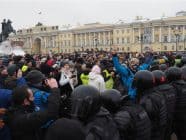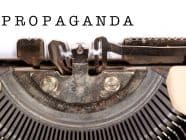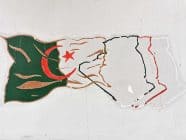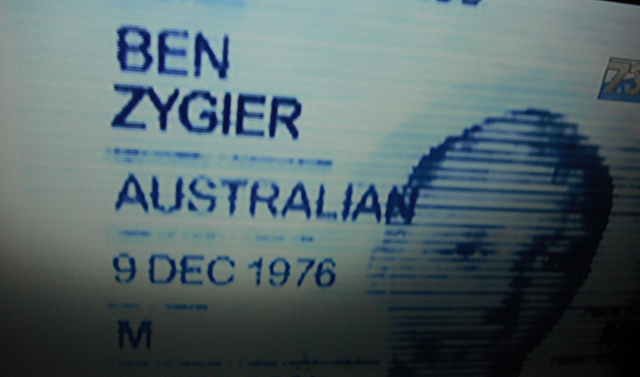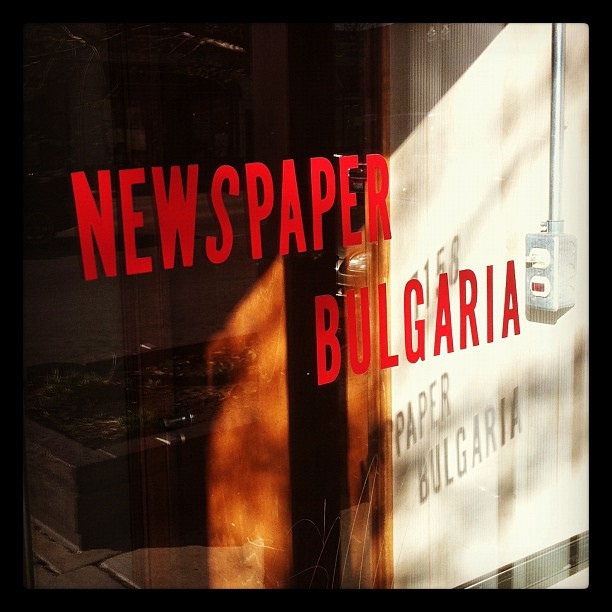Belarusian journalists have long worked under extremely difficult conditions and have had to contend with limited access to information and the severe curtailment of freedom of speech. Volha Siakhovich looks at the latest media crackdown sparked by the recent presidential election and at how journalists have responded to the government’s actions.
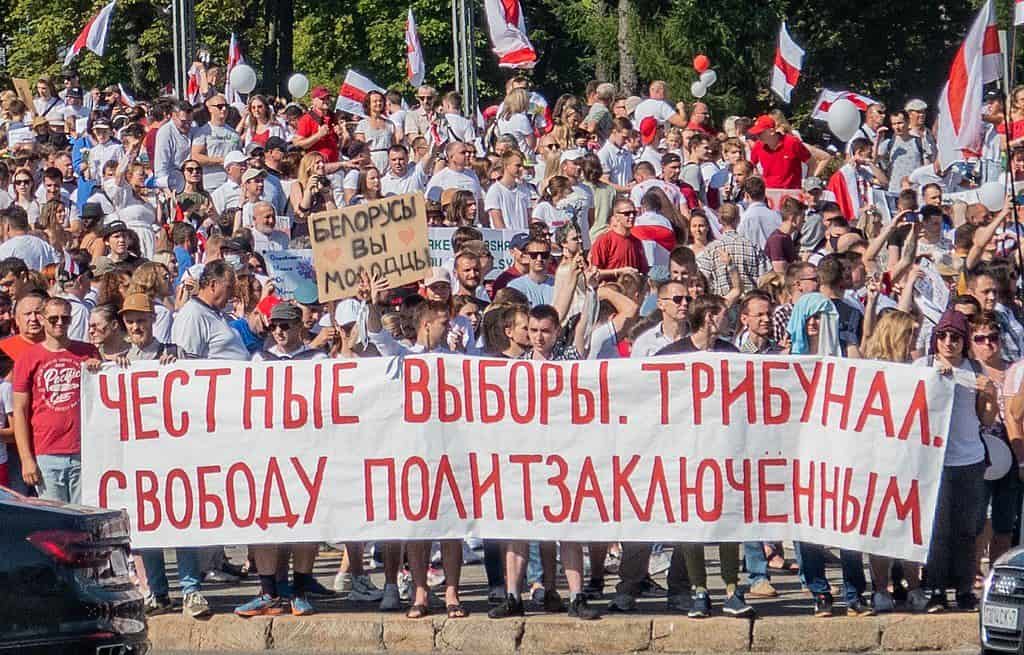
Protestors in Minsk call for fair elections, for President Lukashenka to be held to account and for political prisoners to be set free.
Throughout Alyaksandr Lukashenka’s presidency, Soviet-style propaganda has been one of the main tools used to influence public opinion. And it is the job of the Ministry of Information – whose sweeping powers include the authority to shut down media outlets – to ensure that few alternatives to the state propaganda can be heard.
The media sphere in Belarus can be divided into two sectors: state-run and independent. Media outlets in the independent camp are either privately owned or funded from abroad. The division into two sectors has given rise to two unions representing media workers: the pro-government Belarusian Union of Journalists and the Belarusian Association of Journalists (BAJ), which mainly looks after the interests of journalists working for independent media.
All Belarus-based TV channels are state-controlled. The only TV channel that offers an alternative point of view is the Belarusian-language satellite channel Belsat, which is based in Poland. Belsat is a subsidiary of Polish Television and is funded by Poland’s foreign affairs ministry, Polish Television and international donors.
Constant threat of harassment
Belarusian independent media and citizen journalists have for years operated in extremely adverse conditions, with limited access to information and under the constant threat of police harassment and judicial prosecution. This means that not only does BAJ protect the interests of its members – it also acts as a human rights organisation, defending freedom of speech in Belarus.
State-run media outlets are funded from the state budget and are generously resourced. However, this does not necessarily translate into a bigger audience. Online, where private media can operate relatively freely, they have achieved a significantly greater reach than their government counterparts. This has been boosted by the steady growth of Internet access in Belarus (about 80% of the population by 2020) and by the process of generation change. We have now reached a point where the Internet generation has replaced the TV generation.
In 2017, live webcasts produced by journalists and bloggers covering protests against what became known as the “social parasites tax” (imposed on citizens not in full-time employment) rendered government propaganda ineffective. This was the point at which the authorities lost the information war on the Internet. The government’s response to this was to adopt amendments to the Media Law that made it easier for the state to curb freedom of speech online. These amendments resulted in an increased number of prosecutions for statements made in the online space.
Violent crackdown
The 2020 presidential election campaign has clearly demonstrated the extent to which Belarusians have lost faith in Lukashenka and are more than ready for change. This year, media freedom has deteriorated dramatically as the authorities launched a violent crackdown in a bid to discourage journalists from reporting on election-related protests. Since May, the authorities have stepped up their efforts to curb media coverage of the protests, with more journalists being arrested than ever before.
For three days after the election, which took place on 9 August, Internet access in Belarus was severely disrupted. At times, the blackout was total; at other times, specific Internet services, websites, social networks and messaging services – both local and global – were blocked. Access to a number of media websites was blocked as a result of targeted government action. One of the first to be blocked was the BAJ website, as was the BAJ hotline mobile number for journalists.
Despite these difficult and dangerous conditions, independent journalists have continued to carry out their professional duties.
During three days of turbulent post-election protests, more than 70 Belarusian and foreign journalists were arrested and 54 were kept in detention. Journalists were also the targets of brutal treatment on the part of the riot police: 25 journalists were beaten up, three were wounded when police fired rubber bullets and stun grenades at the protesters, and many had equipment damaged or seized. Several foreign journalists were deported and had entry bans ranging from five to ten years imposed on them.
Tipping point
Despite these difficult and dangerous conditions, independent journalists have continued to carry out their professional duties. BAJ has been continually monitoring the situation and providing assistance to the affected journalists.
The journalists who experienced Belarusian police brutality for themselves have ensured that accounts of their treatment have reached a wide audience. Once the Internet became accessible again and these reports came to the attention of the domestic audience, protests against the violence were held across the entire country.
For many journalists working for state-run media, the violence against their fellow citizens represented a tipping point. Some well-known TV hosts publicly declared their opposition to Lukashenka’s policies and quit.
Hundreds of employees of the state broadcaster went on strike and launched a protest against censorship, demanding that they be given the chance to tell the truth about what was going on in their country. Some of these employees also left their jobs. Staff at the state-owned daily Zviazda and the state-run regional radio station Radio Stalitsa did the same.
Hybrid war
To ensure that Belarusian TV could continue to function and that events would be framed in the correct way, Lukashenka swiftly recruited Russian “mercenaries” – contributors to notorious propaganda channels such as Russia Today – and offered them salaries several times higher than the ones Belarusian employees are used to receiving.
Shortly before the election, Lukashenka claimed that a hybrid war was being waged against Belarus by unspecified forces. However, as BAJ chairman Andrei Bastunets has pointed out, it is perhaps truer to say that the Belarusian regime is now engaged in a hybrid war against its own people.
On 21 August, the Ministry of Information ordered Internet service providers to block 73 news websites and websites of civil society organisations. The list includes influential media outlets such as Belsat TV, the Belarusian service of Radio Liberty, and Euroradio. Though the BAJ website does not appear on the list and the Ministry of Information denies that it has been blacklisted, it has not been possible to access it from within Belarus since 9 August.
In addition to online media outlets, the influential newspapers Komsomolskaya Pravda (its Belarus edition), Narodnaya Volya, Belgazeta and Svobodnye Novosti have been targeted. The state printing house refused to print them, claiming technical problems.
On 22 August, BAJ issued a statement demanding the restoration of access to websites, the lifting of pressure on the media and for newspapers to be able to appear again. BAJ called on Belarusian and international organisations to support this statement.
With such gross violations of the rights of journalists, the Belarusian authorities are denying citizens’ right to information. By declaring war on the independent press, they have declared war on the truth.
Opinions expressed on this website are those of the authors alone and do not necessarily reflect or represent the views, policies or positions of the EJO.
If you liked this story, you may also be interested in “Threats to press freedom in Europe’s democracies“.
Follow us on Facebook and Twitter.
Image: Anti-Lukashenka protest, Minsk, 16 August 2020. Photo by Homoatrox / Source: Wikimedia / Licensed under CC-BY-SA-3.0
Tags: Belarus media crackdown, Belarusian Association of Journalists (BAJ), Belsat, Propaganda, Radio Liberty, Russia Today


